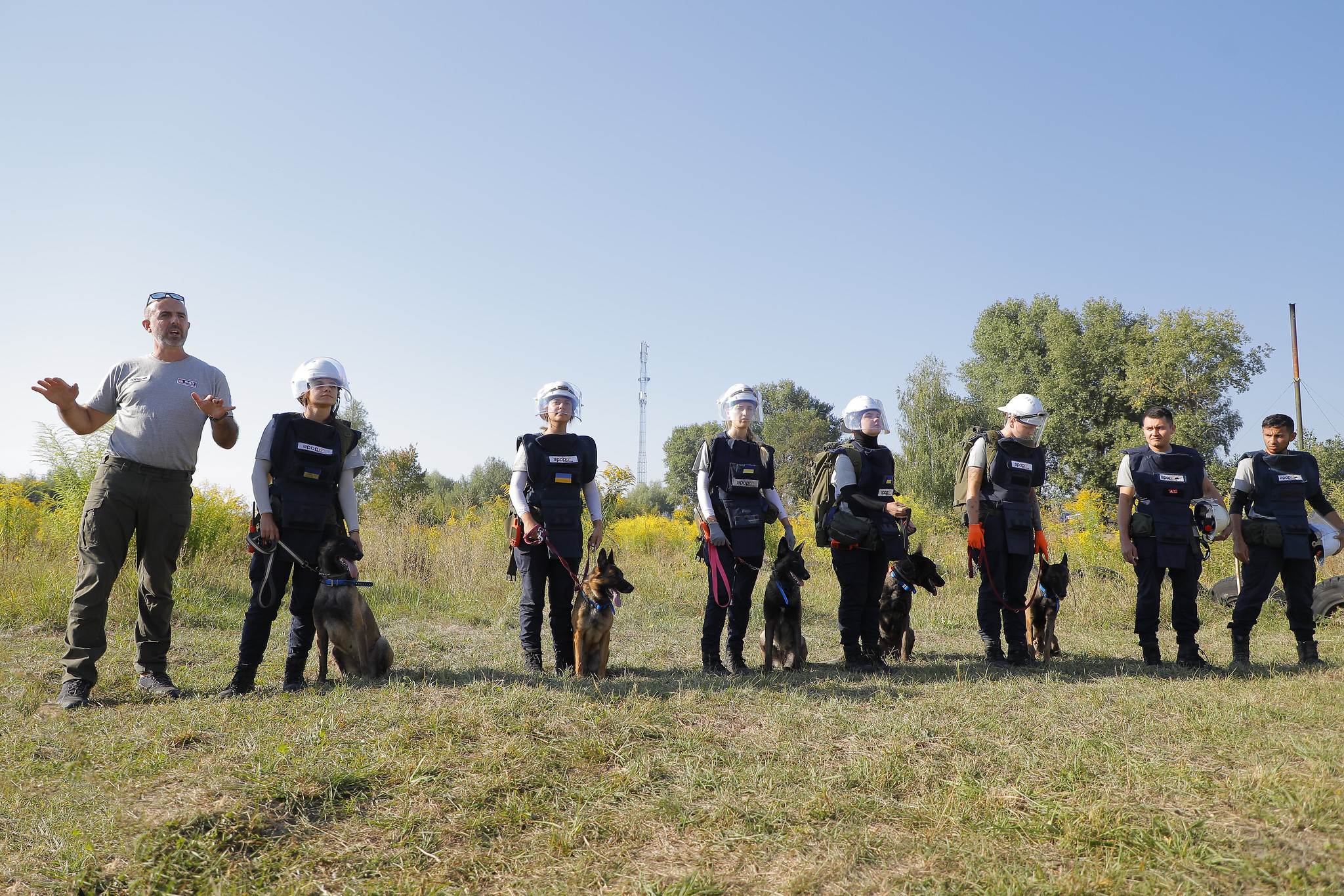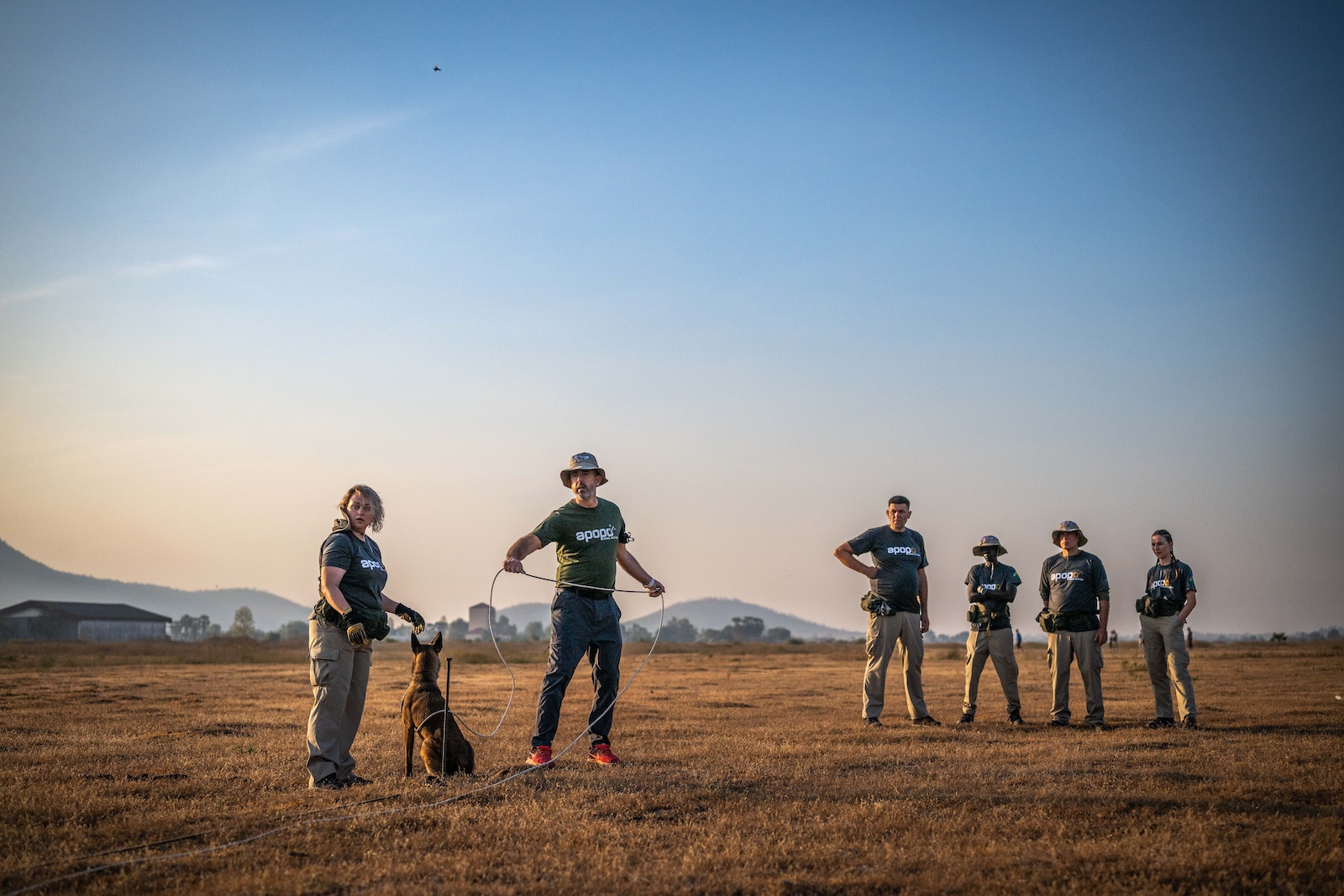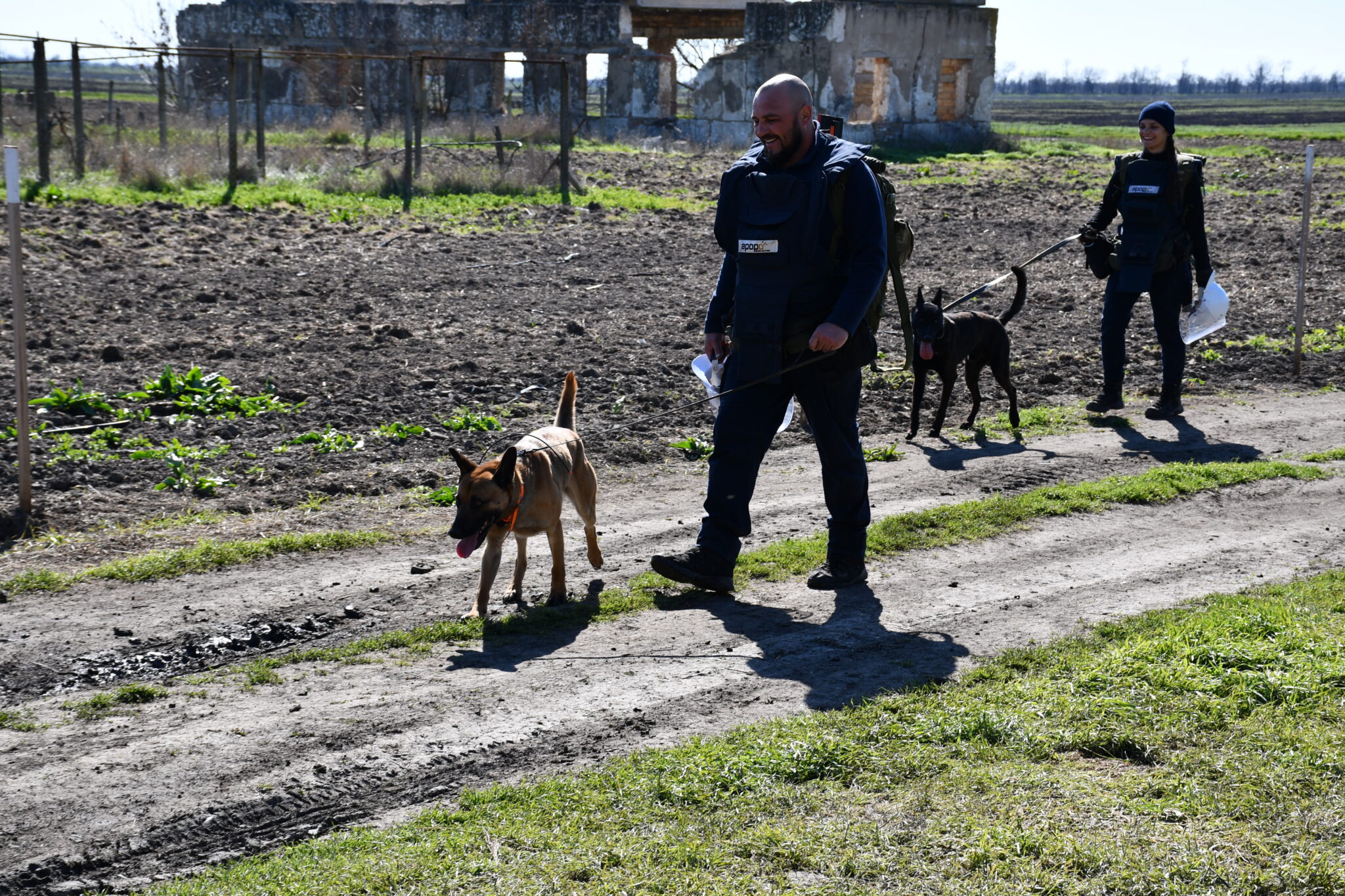Kyiv, 23 April, 2025 – Across Ukraine, explosive remnants of war (ERW) and landmines continue to pose a silent but deadly threat to civilians, farmers, and displaced families. These hidden dangers not only take lives but prevent people from returning home, farming their land, or rebuilding schools and communities. The scale of contamination is immense, and the work of clearing it is painstaking and dangerous.
To meet this challenge head-on, APOPO has deployed its Technical Survey Dogs to Ukraine. These specially trained dogs, paired with dedicated human handlers, are an essential part of humanitarian mine action operations across the country. In collaboration with MAG (Mines Advisory Group), APOPO’s detection dogs are helping make land safe again — one field at a time.
APOPO in Ukraine: A Mission of Urgency and Scale

APOPO began its operations in Ukraine in August 2024, launching with 16 Technical Survey Dogs (TSDs) and eight female Ukrainian handlers. This marked the start of an ambitious, EU- and UNDP-supported initiative, backed by the governments of the Netherlands, Spain, and Flanders. The objective was to survey thousands of square kilometers in areas like Kharkiv and Mykolaiv Oblasts to establish Ukraine-specific mine action standards.
Fast forward to today, and APOPO has scaled significantly. We now have 49 dogs and their handlers deployed in the country, making Ukraine one of APOPO’s largest international Mine Action programs. Our teams are active in regions where the threat of mines is constant and severe, providing critical support to the larger national effort to restore land for safe and productive use.
A Strong Partnership: APOPO and MAG
APOPO and MAG work side by side in this mission. MAG provides operational leadership and logistical coordination, while APOPO delivers the canine detection expertise that is proving essential in technical survey and clearance.

Every dog and handler in Ukraine has been trained by APOPO’s specialized teams, at APOPO’s Dog Training center in Cambodia. Together, the two organizations form a powerful alliance to tackle one of the world’s most urgent demining challenges.
Getting to Know the Teams
In Mykolaiv, APOPO operates three fully staffed teams, each led by experienced international team leaders and composed of Ukrainian handlers. These handlers, many of them women, guide two dogs each. The bond between the handlers and their dogs is deep, built on trust, training, and shared purpose.
Among them are handlers like Dmytro, who works with HeroDOGs Boas and Rambo, and Anna, who teams up with German and Kenny. Dina works with Elate and Gangsler, while Viktoriia partners with Koko and Bonny. Each name represents hours of daily dedication, emotional investment, and skilled teamwork.
As one handler put it, “These dogs are more than colleagues. They’re friends, they’re family, and together we make each other better.”
What HeroDOGs Do in the Field
APOPO dogs, fondly nicknamed HeroDOGs, are trained to detect even the faintest scent of explosives in complex terrain. Depending on the mission, they serve one of two roles:
Mine Detection Dogs (MDDs)
MDDs search shorter lanes, typically 10 meters long, to detect mines and unexploded ordnance. Their work is especially valuable in areas where mechanical tools are ineffective or unsafe. MDDs help open access lanes and breach hazardous zones so that manual deminers can follow safely.
Technical Survey Dogs (TSDs)
TSDs are a groundbreaking innovation developed by APOPO — the first and only organization in the world to train dogs specifically for technical survey in Mine Action. These highly trained dogs are revolutionizing land release by rapidly identifying hazardous areas with unmatched precision and efficiency. Unlike MDDs, they can work in longer 25-meter lanes and cover wider areas more independently. Their role is to confirm whether a specific area is contaminated or safe, accelerating the land release process.
Both types of dogs work within APOPO’s track-and-trace system, which digitally records their movements and search patterns. This system ensures that the dogs’ performance meets or exceeds international mine action standards.
A Typical Day on the Job
The daily routine begins at 7 a.m. in the kennels. Handlers first speak with the kennel assistants to discuss any overnight updates or health concerns. They then carry out basic health checks, feed the dogs, and take them on morning walks before loading into transport vehicles.
In the field, the first task is always a capability test to make sure each dog is focused and ready. Once testing is complete, work is conducted in 30-minute shifts with 10-minute breaks in between. After two hours, a longer break is taken to ensure that both handlers and dogs stay sharp and rested.
Weather plays a critical role in the daily plan. Wind can significantly affect a dog’s ability to detect scent, so APOPO’s team leaders develop several backup plans the night before. On site, they assess the conditions and choose the plan that best suits the situation. Flexibility and foresight are key to making each day successful.
At the end of the fieldwork, teams return to the kennel for training exercises and a daily debrief. APOPO and MAG teams also hold joint planning meetings to prepare for the next day’s operations.
Why This Work Matters So Much for Ukraine

Ukraine is facing one of the most severe landmine crises since World War II. According to international estimates, tens of millions of square meters are contaminated with mines and ERW. These hidden dangers make it impossible for people to return home, replant their fields, or resume normal life.
APOPO’s HeroDOGs are part of the solution. By rapidly and accurately identifying safe areas, they enable faster clearance and safer decision-making for where people can go. The dogs’ work doesn’t just make land safer — it helps restart economies, restore communities, and return hope.
In many rural areas, farmers are among the first to benefit. Land that was once unusable can now be plowed, planted, and harvested. Children can return to schools that once stood empty. Roads can be reopened. And families, many of whom have been displaced for years, can finally return to their homes.
The Road Ahead
With 49 dog-handler teams now active and APOPO’s infrastructure expanding, the organization is poised to grow even further in Ukraine. New dogs are being trained, new handlers are being recruited, and new regions are being assessed for deployment.
According to Juan, a Dog Team Leader in Ukraine, “The scale of the contamination here is unlike anything we’ve faced before. But we are ready. Our teams are committed. The HeroDOGs are ready. And we will keep working until the job is done.”
This determination speaks to the resilience of the people behind the mission — and the communities they serve.
A Mission That Inspires
The APOPO Dog program is more than a tool for demining. It’s a symbol of innovation, humanity, and international cooperation. Each dog and handler team represents a beacon of hope in a country that is fighting to reclaim its land and its future.
Whether it’s Boas in a wheat field or Koko at the edge of a village, these dogs are making history. And with each landmine they help detect and each piece of land they help declare safe, they bring Ukraine one step closer to healing.
APOPO’s work in Ukraine is the vital first step and we couldn’t do it without our partners and donors.

